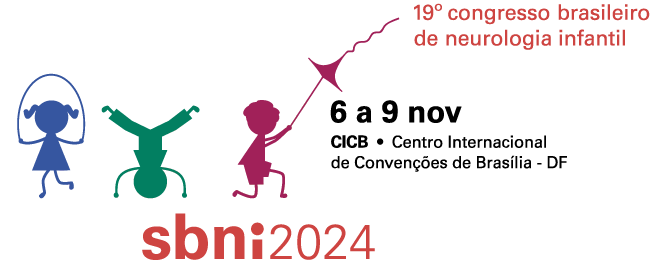Dados do Trabalho
Título
A RARE CAUSE OF EPILEPTIC ENCEPHALOPATHY ASSOCIATED A RING 14 CHROMOSOME MOSAICISM
Apresentação do caso único
Girl, 5 years old, with history of typical febrile seizure onset at 2 years old. After one week of hospital discharge, she started with different types of seizures without fever and treatment refractory: generalizes tonic clonic seizures, myoclonic, gelastic and “drop attacks”. The child had history of speech delay, and poor vocabulary, but her gross motor skills are preserved. She has microcephaly, telecanthus, micrognathia, broad nasal bridge and axial hypotonia. Her pregnancy history was marked with maternal cannabinol exposure during 5th month without other intercurrences. Her parents are a non-consanguineous couple, and there is not history of epilepsy in her family. Her brain MRI was normal; her electroencephalogram showed acute waves on her left occipital lobe ; her karyotype showed a ring 14 chromosome in mosaic associated with pure terminal deletion on chromosome 14 long arm[46,XX,r(14)(p11.2q32)/45,XX,-14]. Her SNP array evidenced a 1018pb deletion on 14q32.33 loci. Her mother karyotype was normal, and her father karyotype was unavailable.
Discussão
Ring 14 chromosome is a rare chromosomal anomaly associated with refractory epileptic encephalopathy with complex epileptic pattern, development delay, facial dysmorphism and ocular anomalies. Other structural congenital anomalies are unusual. Ring chromosomes form due to double breakpoints in both short arm and long arm causing mitotic instability in cells affected. Epileptogenic focus are due to partial monosomy, position effect on gene regulation or mutations in PACS2 gene located in 14q32.3 locus. Twelve cases with terminal linear deletion on 14q32.3 locus have been reported, while 80 cases with ring 14 chromosome are reported with similar clinical features. Among genetic causes, channelopathies, inborn errors of metabolism and other chromosomal anomalies should include in differential diagnosis.
Comentários finais
This case is the first Brazilian case of mosaicism with 14 ring chromosome and linear terminal deletion. It shows the importance of cytogenetics on the diagnosis of refractory epileptic encephalopathy.
Referências
1.Vaisfeld A, Spartano S, Gobbi G, Vezzani A, Neri G. Chromosome 14 deletions, rings, and epilepsy genes: A riddle wrapped in a mystery inside an enigma. Epilepsia. 2021 Jan;62(1):25-40. doi: 10.1111/epi.16754. Epub 2020 Nov 17. PMID: 33205446.
2.Maurin ML, Brisset S, Le Lorc'h M, Poncet V, Trioche P, Aboura A, Labrune P, Tachdjian G. Terminal 14q32.33 deletion: genotype-phenotype correlation. Am J Med Genet A. 2006 Nov 1;140(21):2324-9. doi: 10.1002/ajmg.a.31438. PMID: 17022077.
3.Ortigas AP, Stein CK, Thomson LL, Hoo JJ. Delineation of 14q32.3 deletion syndrome. J Med Genet. 1997 Jun;34(6):515-7. doi: 10.1136/jmg.34.6.515. PMID: 9192277; PMCID: PMC1050980.
4.Zollino M, Ponzi E, Gobbi G, Neri G. The ring 14 syndrome. Eur J Med Genet. 2012 May;55(5):374-80. doi: 10.1016/j.ejmg.2012.03.009. Epub 2012 Apr 14. PMID: 22564756.
5.Rinaldi, B., Vaisfeld, A., Amarri, S. et al. Guideline recommendations for diagnosis and clinical management of Ring14 syndrome—first report of an ad hoc task force. Orphanet J Rare Dis 12, 69 (2017). https://doi.org/10.1186/s13023-017-0606-4
6.Giovannini S, Marangio L, Fusco C, Scarano A, Frattini D, Della Giustina E, Zollino M, Neri G, Gobbi G. Epilepsy in ring 14 syndrome: a clinical and EEG study of 22 patients. Epilepsia. 2013 Dec;54(12):2204-13. doi: 10.1111/epi.12393. Epub 2013 Oct 1. PMID: 24116895.
7.Engels H, Schüler HM, Zink AM, Wohlleber E, Brockschmidt A, Hoischen A, Drechsler M, Lee JA, Ludwig KU, Kubisch C, Schwanitz G, Weber RG, Leube B, Hennekam RC, Rudnik-Schöneborn S, Kreiss-Nachtsheim M, Reutter H. A phenotype map for 14q32.3 terminal deletions. Am J Med Genet A. 2012 Apr;158A(4):695-706. doi: 10.1002/ajmg.a.35256. Epub 2012 Feb 24. PMID: 22367666.
8.Schlade-Bartusiak K, Ardinger H, Cox DW. A child with terminal 14q deletion syndrome: consideration of genotype-phenotype correlations. Am J Med Genet A. 2009 May;149A(5):1012-8. doi: 10.1002/ajmg.a.32752. PMID: 19365838.
Palavras Chave
Cromossomopatias; epilepsia; Neurogenética
Área
Neurogenética
Autores
LUCAS CADETE CALDEIRA COSTA, ANDREA FERNANDES DE ALMEIDA RIOS, SARAH FERREIRA SAMPAIO, FRANCISCO MONTEIRO MENESES, EMÍLIA KATIANE EMBIRUÇU DE ARAÚJO LEÃO
